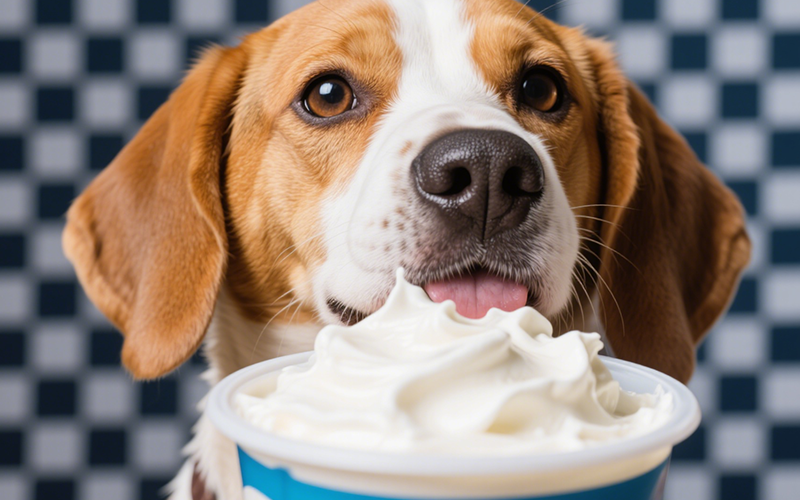Can Dogs Eat Sour Cream? Here's What You Should Know
- 9 Apr 2025 14:44
Sour cream is a popular topping for many human dishes, from tacos to baked potatoes. But is it safe for your dog? The short answer is not recommended, though small amounts may not cause significant harm. Let’s dive into why you should be cautious and the best alternatives for your pup.

Why Dogs Should Avoid Sour Cream 🚫
High in Fat 🧈
Sour cream is typically high in fat, which can lead to weight gain and even more severe health issues like pancreatitis. Dogs do not need much fat in their diet, and consuming fatty foods can strain their digestive systems.Dairy Sensitivities 🐄
Many dogs are lactose intolerant, meaning they have trouble digesting lactose, the sugar found in dairy products. If your dog is lactose intolerant, consuming sour cream can lead to upset stomach, gas, diarrhea, and vomiting. Even dogs that aren’t lactose intolerant might still experience some digestive discomfort from dairy products.High in Calories 🔥
Because sour cream is high in fat and calories, it’s easy for dogs to gain weight if they consume it regularly. Obesity can lead to other health problems like joint pain, heart disease, and diabetes in dogs.Additives and Preservatives 🛑
Store-bought sour cream may contain preservatives or artificial flavoring. These ingredients aren’t ideal for your dog’s health and could potentially cause adverse reactions, especially if consumed in larger quantities.
When Can Dogs Eat Sour Cream? ✅
If you do choose to share a little bit of sour cream with your dog, it should be done in moderation. Here are some important tips:
Small Amounts Only ⚖️
If you decide to give your dog a taste of sour cream, keep it to a very small amount. A spoonful or less, once in a while, is unlikely to cause harm, but make sure it’s not a regular part of their diet.Watch for Allergic Reactions 👀
Even a small amount of sour cream can cause some dogs to have an allergic reaction. Monitor your dog for any signs of digestive upset like vomiting or diarrhea after consuming dairy, and contact a pet health service if symptoms persist.Consider Lactose-Free Options 🧀
If your dog enjoys dairy but has trouble with lactose, consider trying lactose-free sour cream or other lactose-free dairy products. These may be easier for your dog’s stomach to handle, but it’s still important to give them in moderation.
Healthier Alternatives to Sour Cream for Dogs 🦴
If you want to give your dog a tasty treat, there are plenty of healthier alternatives to sour cream:
Plain Yogurt (Lactose-Free) 🍶
If your dog can tolerate dairy, plain, unsweetened yogurt is a much healthier option than sour cream. It contains probiotics, which are beneficial for digestion, and it’s lower in fat and calories.Peanut Butter 🥜
Many dogs love peanut butter, and it’s a great source of healthy fats and protein. Just be sure to avoid peanut butter that contains xylitol, as this is toxic to dogs.Carrot or Cucumber Slices 🥕🥒
For a crunchy, healthy snack, try offering your dog carrot sticks or cucumber slices. These low-calorie treats are great for digestion and provide important vitamins.Sweet Potato 🍠
Sweet potatoes are packed with fiber and vitamins and are easy on your dog’s stomach. You can serve them cooked or dehydrated as a healthy treat.Homemade Dog Treats 🦴
If your dog enjoys creamy snacks, consider making your own dog-safe treats. You can make peanut butter banana frozen pops or yogurt-based treats with dog-friendly ingredients.
How PettureX Can Help 🧠
If you’re ever unsure about your dog’s diet, or if you need advice on what’s safe and healthy for your pup, PettureX is an excellent resource. With 24/7 online consultations and pet image recognition, PettureX can provide tailored guidance and help ensure that your dog’s diet is both nutritious and safe.
Conclusion: Can Dogs Eat Sour Cream? ✅
Sour cream is not recommended for dogs due to its high fat content, potential for digestive issues, and additives. While a small amount now and then may not cause immediate harm, it’s better to avoid making it a regular treat for your dog.
Instead, opt for healthier, dog-friendly alternatives like plain yogurt, vegetables, or peanut butter. Your dog’s health will thank you!
If you're ever uncertain about your dog’s diet, reach out to PettureX for expert advice. 🐾💚
Related

Can Dogs Eat Peaches? Vet Explains Benefits, Cyanide Risks & Safe Serving
- 16 Apr 2025
Can Dogs Eat Mulberries? Vet Explains Safety, Benefits & Potential Risks
- 16 Apr 2025
Can Dogs Eat Mozzarella? Vet Explains the Cheesy Truth (Risks & Benefits)
- 16 Apr 2025
Can Dogs Eat Maple Syrup? The Sugary Truth & Why Vets Advise Against It
- 16 Apr 2025
Can Dogs Eat Mango Skin? Vet Explains Why It's a Risky Chew!
- 16 Apr 2025
Can Dogs Eat Mac n Cheese? Vet Explains Why This Comfort Food Is Unsafe!
- 16 Apr 2025
Can Dogs Eat Liver? Vet Guide to This Nutrient-Dense Organ Meat (Benefits & Risks!)
- 16 Apr 2025
Can Dogs Eat Lamb? Vet Insights on This Nutritious Meat Option
- 16 Apr 2025
Can Dogs Eat Licorice? The Sweet Danger & Glycyrrhizin Risk Explained by Vets
- 16 Apr 2025
Can Dogs Eat Jelly? The Sweet Truth About Sugar, Xylitol & Why Vets Say No!
- 16 Apr 2025
